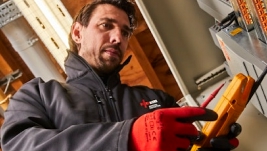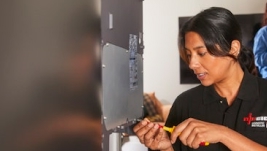The latest update to the Electrotechnical Assessment Specification (EAS) introduces key changes that may impact your business.
Changes come into effect 1 October 2026.
They include:
- Clearer competence requirements for all ‘employed persons’* and qualified supervisors (QSs) undertaking periodic inspection and testing.
- New low carbon work categories – qualifications will soon be required for all 'employed persons'* and QSs undertaking this work.
These changes are not specific to NICEIC. The EAS is intended for use by all electrotechnical certification bodies, so the updates will apply to all certified businesses across the industry.
*The term 'employed persons' refers to any individuals engaged by your business to perform electrotechnical work, which may include directly employed staff, temporary or agency workers, and/or subcontracted labour, including self-employed individuals and sole traders.
Step 1
Review the information below to identify the areas of your business that may be impacted based on the type of work you do.
Step 2
Identify any additional training and resources required to meet the new requirements.
Step 3
Talk to us. We are here to help your business get ready.
T: 03333 218 225
E: easchanges@niceic.com
or request a call back

Does your business carry out EICRs under your certification with NICEIC?

All employed persons undertaking this work and QSs responsible for it need to:
- have evidence of at least two years’ experience in periodic inspection and testing
- hold the relevant acceptable qualifications
- have evidence of ongoing continuing professional development (CPD)
NICEIC offers two C&G Level 3 Awards to support this requirement.
View training coursesEV charging installations

Does your business carry out EV charging installations under your certification with NICEIC?

All employed persons undertaking this work and QSs responsible for it will need to:
- hold the relevant acceptable qualifications from 1 October 2026
NICEIC offers an EAL Level 3 Award to support this requirement.
View training courseIn addition to the qualifications, you will also need access to the latest technical reference documents:
and you should be using the correct test instruments:
- IET CoP – Earth voltage rise (Fuel Filling Stations)
- Earth Electrode**
Solar PV installations

Does your business carry out solar PV installations under your certification with NICEIC?

All employed persons undertaking this work and QSs responsible for it will need to:
- hold the relevant acceptable qualifications from 1 October 2026
NICEIC offers an EAL Level 3 Award to support this requirement.
View training courseIn addition to the qualifications, you will also need access to the latest technical reference documents:
- IET Code of Practice for Grid Connected Solar Photovoltaic Systems
- MCS The Solar PV Standard (Installation) MIS 3002
and you should be using the correct test instruments:
- Earth Electrode**
- Solar Irradiance
- AC/DC Clamp meter
Electrical energy storage systems

Does your business carry out electrical energy storage systems installations under your certification with NICEIC?

All employed persons undertaking this work and QSs responsible for it will need to:
- hold the relevant acceptable qualifications from 1 October 2026
NICEIC offers an EAL Level 3 Award to support this requirement.
View training courseIn addition to the qualifications, you will also need access to the latest technical reference documents:
- IET Code of Practice for Electrical Energy Storage Systems
- MCS The Battery Standard (Installation) MIS 3012
and you should be using the correct test instruments:
- Earth Electrode**
- AC/DC Clamp meter
**The use of an earth fault loop impedance test instrument may also satisfy the requirement for testing an Earth Electrode, in accordance with BS 7671, Regulation 643.7.2.
We are here to help
If you would like to speak with our team, please contact us on 03333 218 225 or email easchanges@niceic.com
View our special episodes of The Wire, where our experts explain the changes in more detail and answer your questions:
Electrotechnical Assessment Specification (EAS): what this means for certified businesses
Unlocking Level 3: routes to achieving qualifications required by the EAS
Request a call back
Need support or more information about the EAS Changes?
Fill in your details below and one of our friendly team will get back to you as soon as possible.
If the form fails to load please click here to open it in a new window.
What is the Electrotechnical Assessment Specification (EAS)?
The EAS is an industry agreed specification intended for use by certification and registration bodies undertaking the assessment of businesses carrying out electrotechnical work.
It has been drawn up by organisations representing the electrotechnical industry and consumer safety interests to enhance the safety of electrotechnical work. These organisations include competent person scheme providers, trade associations, the Building Safety Regulator, the Welsh Government, ECA, Electrical Safety First, the Electrotechnical Skills Partnership, UKAS, and the Institution of Engineering and Technology.
Why has it changed?
Following the Grenfell Tower fire in 2017, which tragically claimed 72 lives, Dame Judith Hackitt’s review of the tragedy highlighted a lack of consistency in competence standards across the built environment industry. The report identified significant safety failings in the current system and paved the way for sweeping changes to building and fire safety laws.
NICEIC welcomes these changes, and supports the report’s recommendations that certification bodies like ours have a responsibility to ensure all certified businesses are competent to undertake work safely, and that this competence can be consistently assessed and verified.
What's changing and when?
1. Clarified wording around periodic inspection and testing
The updated EAS states all 'employed persons' or QSs who carry out, or are responsible for, periodic inspection and testing work must have:
- evidence of at least two years’ experience in periodic inspection and testing
- the Periodic Inspection and Testing of Electrical Installations (2391-51), Level 3 Award,
or the Initial and Periodic Electrical Inspection and Testing (2391-52), Level 3 Award
or another acceptable relevant qualification - evidence of ongoing continuing professional development.
This requirement does not preclude trainees and apprentices from undertaking periodic inspection and testing under close supervision so they can gain vital experience.
If your business does not yet meet this requirement, from October 2025, your assessor will need to document this on your assessment report. However, please be assured:
- This will not immediately affect your ability to carry out periodic inspection and testing under your certification with NICEIC.
- You will have until 1 October 2026 to meet this new requirement for 'employed persons'* and qualified supervisors undertaking or responsible for periodic inspection and testing work.
2. New low carbon work categories
The following four new categories have been added to the EAS:
- Electric vehicle charging equipment (EVCE) installation (both in dwellings and 'other than dwellings')
- Solar photovoltaic (PV) systems installation (both in dwellings and 'other than dwellings')
- Electrical energy storage systems (EESS) installation (both in dwellings and 'other than dwellings')
- Micro wind turbine installation (both in dwellings and 'other than dwellings')
Businesses working in these areas must ensure that all 'employed persons'* and QSs undertaking, or responsible for, this work hold appropriate qualifications. We recommend familiarising yourself with these categories and the required qualifications now to prepare for the upcoming changes. You will have until 1 October 2026 to meet these new requirements relating to electrical work undertaken in any of the new work categories.
Qualification requirements for the new work categories
The qualifications your business will need to meet the mandatory technical competencies (MTCs) requirements for each work category can be found here. Below, we've listed the accepted qualifications offered by NICEIC. These are available to book via the NICEIC online shop or via the links below.
EVCE installation:
EAL Level 3 Award in the Installation of Electric Vehicle Charging Points
Solar PV installation:
EAL Level 3 Award in the Installation of Small-Scale Solar Photovoltaic (Solar PV) Systems
EESS installation:
EAL Level 3 Award in the Design, Installation and Commissioning of Electrical Energy Storage Systems (EESS)
Technical Reference Documents for new work categories
We recommend your business reviews the latest versions of the Technical Reference Documents. You will need to have these to hand when operating in any of the new work categories.
You can purchase the following Technical Reference Documents from the NICEIC online shop:
- IET Code of Practice for Electric Vehicle Charging Equipment Installation
- IET Code of Practice for Grid Connected Solar Photovoltaic Systems
- IET Code of Practice for Electrical Energy Storage Systems
You can also access the following Technical Reference Documents published by MCS here:
*The term 'employed persons' refer to any individuals engaged by your business to perform electrotechnical work, which may include directly employed staff, temporary or agency workers, and/or subcontracted labour, including self-employed individuals and sole traders.
**The use of an earth fault loop impedance test instrument may also satisfy the requirement for testing an Earth Electrode, in accordance with BS 7671, Regulation 643.7.2.
It has been drawn up by organisations representing the electrotechnical industry and consumer safety interests to enhance the safety of electrotechnical work. These organisations include competent person scheme providers, trade associations, the Building Safety Regulator, the Welsh Government, ECA, Electrical Safety First, the Electrotechnical Skills Partnership, UKAS, and the Institution of Engineering and Technology.
The key changes include a clarification of the required qualifications for ‘employed persons’* and qualified supervisors undertaking or responsible for periodic inspection and testing, and the addition of new work categories and qualification requirements covering renewable technologies. These changes aim to support competence and safety across the electrical industry.
*The term ‘employed persons’ refers to any individuals engaged by your business to perform electrotechnical work, which may include directly employed staff, temporary or agency workers, and/or subcontracted labour including self-employed individuals and sole traders.If any of your employed persons or QSs carry out or are responsible for periodic inspection and testing work, they must now hold a recognised qualification – specifically, the Periodic Inspection and Testing of Electrical Installations (2391-51), Level 3 Award, or Initial and Periodic Electrical Inspection and Testing (2391-52), Level 3 Award or another acceptable relevant qualification.
They will also be required to have evidence of at least two years’ experience of undertaking periodic inspection and testing and evidence of ongoing continuing professional development.
If your business does not yet meet this requirement, from October 2025, your assessor will need to document it on your next assessment report.
This will not immediately affect your ability to carry out periodic inspection and testing under your certification with NICEIC.
You will have until 1 October 2026 to meet this new requirement.
Businesses working in these areas must ensure all employed persons and QSs undertaking, or who are responsible for, this work hold appropriate qualifications for that scope of work from 1 October 2026. You will also need to obtain the relevant Technical Reference Documents and have access to the required additional test equipment.
In the meantime (where relevant), your assessor may ask you to make available samples of work in the new categories at your assessment.
You will have until 1 October 2026 to meet these new requirements relating to electrical work undertaken in any of the new work categories.
The Technical Reference Documents relevant to the new work areas are as follows:
|
EVCE installation |
IET Code of Practice for Electric Vehicle Charging Equipment Installation |
|
Solar PV installation |
IET Code of Practice for Grid Connected Solar Photovoltaic Systems |
|
EESS installation |
We are here to help
If the information provided does not fully answer your questions and you would like to speak with our team, please contact us on 03333 218 225 or email : easchanges@niceic.com
